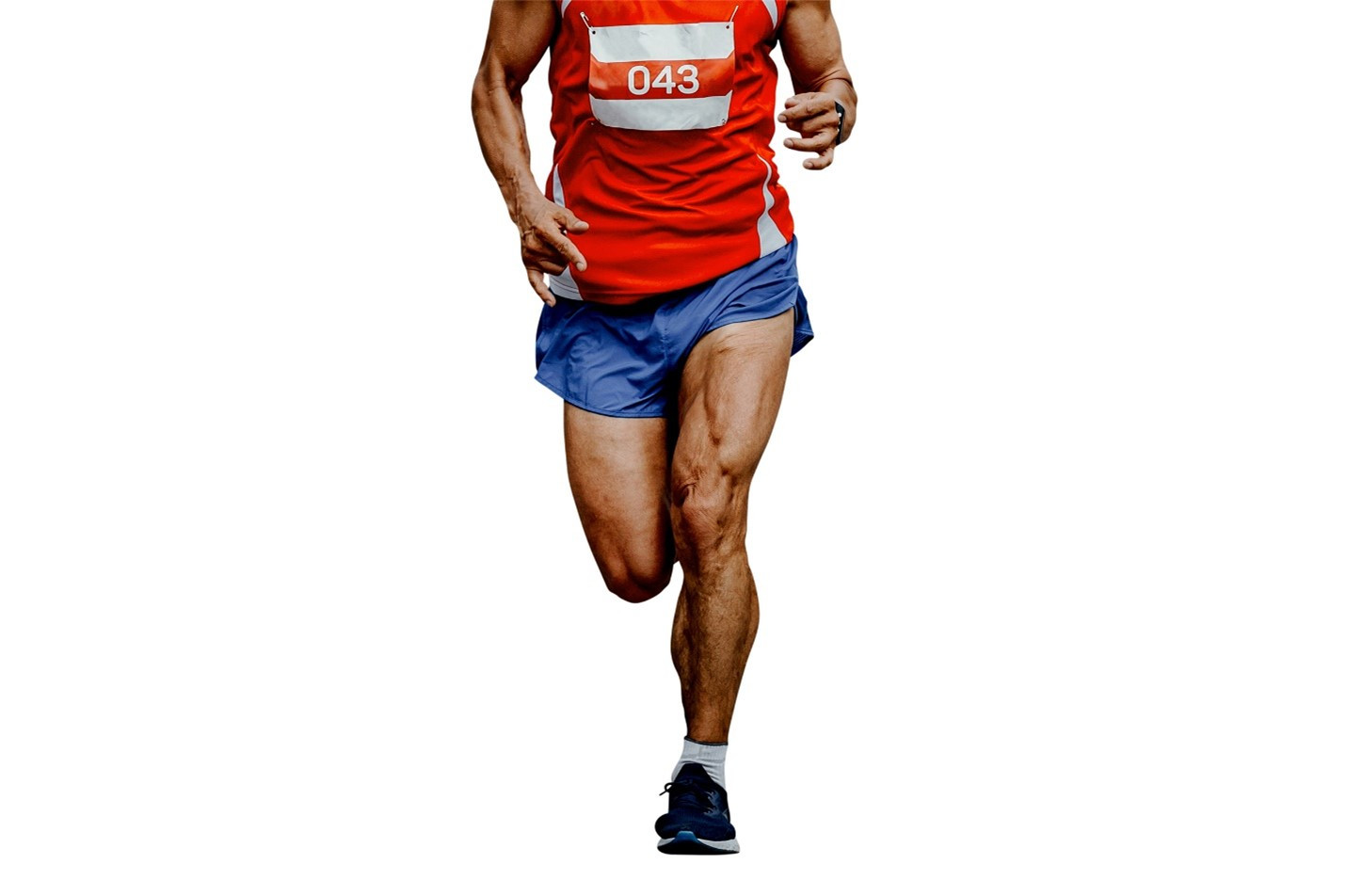Running
Welcome and thanks for visiting...

How to Train for Your First Marathon Part II

Before I could run 100 marathons in 100 days, I had to run one marathon. I was not a runner just one year before I ran my first and 99 others.
You may only want to run one marathon, or maybe just a few. Along the way, I discovered is the best way to train for your first marathon, especially if you are new to running.
If you want to enjoy running your first or next marathon faster, easier, and with less training, here’s how to do it:
In the countless hours and miles of running super ultra-distances, I have learned a few things that will help you run longer, faster, and easier, with minimal risk for injury. Plus, minimize your pain and suffering so that you never feel like you want to die after a run. In fact, with my strategies, you will love the experience of training for your first marathon. Or should I say marathons? Once you do one, and you finish with relative ease, you might just want to do more. But even if your goal is just one-and-done to check off your bucket list, this is the best plan you will find.
Let me be clear
You will learn to run a marathon with "relative" ease. It is much easier than traditional common running advice. That said, you still have to put in the time and the work. No free lunch at the end of the marathon … ever. There is no way around that. For example, if I eat a salad, you don't get healthier. You have to put in the time and training to prepare for a marathon. But you will be able to do it easier than any other method, maximizing your result while reducing your efforts.
First
Forget the "Grind and die" hype that teaches you to run faster for your best personal record (PR). Seriously, the hype will get you hurt, keep you in pain, and risk severe injuries. The worst thing you can do while training for a marathon is to train wrong, run wrong, push too hard, and injure yourself because this will delay your training, and delay when you will be ready to run your marathon.
With my method, you will always be trending into new personal records or personal best, but without the trauma of harsh training that leaves you excessively sore and dreading the next run workout.
Slow Is Fast
This is a ridiculous cliché, but it is true for marathon training.
Muscles adapt quickly
Everything else adapts slowly
Muscles are not generally the problem. The high-risk problems will be the knees, ankles, feet, hips, and connecting tissues. Even your toes can stop you dead in place. I had a blister while breaking the world record in Death Valley. I was almost stopped by a blister that formed on top of an old blister on my pinky toe. In case you are wondering, I sliced it off. The blister, not the toe. Then I finished the race to break the course record by almost 5 hours becoming one of the most elite runners in the world.
It’s often the small things that can cause the biggest problems.
Tendons, ligaments, meniscus, cartilage, the smaller auxiliary muscles are the injuries that will stop you in your tracks. The major muscles that are now being worked at a high level, are all at high risk of injury when you train wrong. Tear a tendon or a ligament and you are on crutches for months. Hurt your knee, you may never be able to run a marathon.

Be smart, train smart, and listen to your body
Here is the interesting part.
You don't have to kill yourself in training to run a solid marathon with a respectable time. It will surprise you how fast you will improve by training less than the normal recommendations you see promoted by "grind and die" type coaches. Some people love that … me … I'd rather use the least effective dose. In other words, how can you do less and achieve the same and better results?
Start slow
It doesn’t matter if it is your first training day or your 100th marathon. Start slow. Here’s what I mean.
When I run a marathon, I will start in the 14-minute pace group. What? That’s so slow. It’s almost double my average marathon pace. Why? Because everyone runs faster than they should at the start. It is human nature and the influence of group mentality. This is why most runners are dying in the last 5 - 6 miles.
The 14-minute pace groups start at a 12-minute pace for the first mile or two. This means my initial mile is often an 11–12-minute pace as I warm up. Starting slow allows your body to activate your endless stores of energy in fat storage. Then I get incrementally faster each mile … until I cross the finish line. I run negative splits for the whole marathon. Meaning I get faster with every mile, and I don't run out of energy. Finishing strong with a smile on your face is the best feeling in the world.
While others are dying at mile 20, I am still getting stronger and faster. I’m the guy who runs past you saying in a relaxed and joyful voice, “You got this! Stay strong.” While under your breath you are saying, “Grrr, F@(&$r!”

This is how I can also run over 100 miles without stopping. I am not genetically gifted. I am not built any differently than you. I do not have a runner physique or natural running talent. But I have learned how to tap into the super strength and endurance of my body. The strength that we all have if we use it correctly. You do too. You probably won't ever run across America, but what about running one marathon and feeling good at the end?
How will it feel when you show up to work the next day after a Sunday marathon and you look stronger than when you left on Friday? Go ahead, wear the medallion to the office, it’s cool to brag. You just did what 99.86% of Americans will never do. You might inspire others.
What happens to most runners in a marathon?
They are dying by mile 20. Why? Because they started too fast. This is bad because it tells your body that it needs immediate and fast energy, so it taps into sugar storage. Sugar energy is great for sprints, interval training, and sex. But it is bad for a 26.2-mile marathon and ultra-distance races.
For long-distance endurance, you want your body to understand that you are in this for the long haul. You must signal your body that it needs to use its fat storage, which is almost unlimited. Your body can run on your stored fat for many hours and even for days. This is how superhuman runners compete in multi-day running events without rest. But sugar, you get 2 to 3 hours max. Running on sugar reserves is bad for most marathoners and certainly all new marathon runners, recreational runners, and bucket list runners.
Benefits of the Start Slow, Finish Strong” method
BENEFIT #1
That spare tire that you cannot seem to get rid of, that's because you are using fast-burning sugar during your workouts without tapping into the slow burn fat stored on your body. This is why even seasoned marathoners can have belly fat. But if you change your training method, you will start using the spare tire and the fat in your thighs as energy. The fat around your waist will melt away while giving you nearly endless energy to train for your marathon.
BENEFIT #2
Do you want to feel like you’re ready to die at the end of every training session and every race? Or do you want to feel amazing and strong? I’ve done both. There were many races when my body was in spasm after the race, and I couldn’t walk for days. Now I run marathons and feel like it was an easy training run and feel amazing the next day. I prefer feeling amazing when I cross the finish line and then go out and celebrate with family and friends.
BENEFIT #3
Critics will argue that this method will not get new my best times or set new personal records. Not true. This method will always trend towards new PR and new personal bests. There are faster methods to reach new PRs, but they are "grind and die" style workouts that are going to hurt you at some point. Guaranteed! Then if you get hurt, you lose all your gains while you recover from your injuries and you have to start over again to build back up. So in the end, the start slow method wins every time.
Why?
Because you are constantly training your body into its optimal growth zone without reaching the stress training zone. AKA, injury zone. This means you maximize your gains while minimizing your risk of injury or excessive soreness or muscle pain.
THE METHOD
How to Train for Your First Marathon
I won’t tell you how much you should run every day because that is ridiculous because I don’t know you. I will give you the method to train so that you know how much to run but the way you feel. Your body will tell you because it is designed to run.
I don’t know if you are overweight, male or female, 25 or 75. None of that is super important. You can run a marathon no matter where you are starting. The only difference will be the time it takes you to get to the start line.
RULE OF 7
The rule of 7 puts you at the optimum sweet spot of training to maximize your results and minimize your training. From Level 1 - 10, your goal is to stay in level 7 training most of the time. After you start slow and warm-up, of course.
The sample Levels
Level 1 - Sleeping.
Level 2 - Sitting on the couch.
Level 3 - Moving about the house
Level 4 - Casual walk
Level 5 - Brisk hardy walk
Level 6 - Easy casual run
Level 7 - Strong but comfortable run
Level 8 - Strong run at the edge of your max breath
Level 9 - Pushing beyond max breath for shorter distances
Level 10 - All-out sprint for short distances with collapse at the end.
Level 7 Training
Optimize your training by pushing just a little out of your current comfort zone. This will allow you to always grow, but never push so hard that you will get hurt. At Level 7, every training run will make you stronger without making you dread the next workout and minimizing your risk of injury or pain.
Level 7 increases as you get stronger. The magic happens because as you get stronger, running at Level 7 will mean you get faster, stronger, and more efficient. Level 7 is always the optimum sweet spot of training even as you get stronger, faster, and run longer distances. Always moderately difficult, but never crazy "grind and die" hard.
Level 7 is always adapting. Not just over the long term as you get stronger, but even day-by-day. If you are having an off day, then you train easier because that day’s Level 7 is lower. If you are having a strong fast day, then your Level 7 will be a little faster and a little harder. The goal is to listen to your body. Your body always gives you the messages and information that you need. ALWAYS. But you have to listen.
Again, be smart, train smart, and listen to your body
For this reason, I always run without music, audiobooks, or any distractions. I ran 2,600 miles across America in silence. I run like this because I want to be in tune with my body, mind, and emotions. As well as be one with the run and the environment. Running is a form of mindfulness when it is just you, the road, and the run. Most people want a distraction from the run with music or audio programs. That is missing the point of running.
Running in its purest form is nearly spiritual. It’s a zen mindfulness opportunity to reconnect with yourself and the world around you in a way that nothing else can. Especially long runs. We live in a world of distractions. We’ve lost the most crucial connection in life … being comfortable in silence with ourselves.
How Many Days a Week Should I Train?
The best method is to train every day of the week without taking a day off … ever. “Whoa Croix, that sounds intense and the opposite of what you teach.” It’s not and here’s why.

What would normally be a rest day will be a lighter training day. For example; it might be a light jog or even a hill walk. But you are doing something every day. It can also be cross-training like swimming or a type of cross-fit training but is best if you run every day.
Even when you are brand new, you should train every day. Even if that means just walking on some days on your journey to becoming a runner. Then, over time you build up to be able to train at level 7 every day. Why? The reason is not just physical. The most important reason is that … Your success is all in your head, your habits, and your identity.
When you are training every day, who are you? You are the kind of person who trains without fail. You are an athlete. Even if you're a brand new overweight amateur athlete with no plans to win a competition, a person who trains every day is an athlete. Period. I don't care if you are slow or fast, fit or becoming fit. When you train every day, you are an athlete, and I am rooting for you.
There is a dangerous psychological phenomenon that happens when you skip days. Let me give you an everyday real-world example. If you don't tell your spouse that you love them every day, that's not so bad. We all miss days occasionally. But what happens when you don't tell your spouse for several days? Then that turns into weeks. Maybe occasionally you say it but said so infrequency that it no longer has an impact. The damage is already done. You have faded apart as a loving couple. You will be living in a loveless marriage or divorce. This isn't just an analogy, it's real life.
It's the same in running (training). If you miss a day, it is easy to miss two. If you miss three and it is Saturday, well, you might as wait until Monday. The workweek starts, and you don't have the time and the energy, so you will wait until the weekend. It is easy, so darn easy, like a wet slip-n-slide covered in petroleum jelly, to slide back to where you started or give up altogether. This is why you should run every day for at least 30 minutes. Even if some days, running is slow, or even just a walk.
There are a few exceptions. Major holidays and travel days are sometimes examples. That said, my favorite days to run are Christmas, Thanksgiving, New Year's Day, and my birthdays. I have two birthdays, but that is a story for another day. I love these days most. It is the day that it is expected and acceptable to miss a workout day. Training on these days is like a special gift to me to reinforce my identity that health and physical power is my core identity.
As I write this, I cannot run or train for two weeks because I just had surgery. It is frustrating to want to run but not be able to because running is my physical and emotional drug to feeling good. But this is one of those rare circumstances that I have to wait to get back on the road.
I am not a fanatic. I don't crave to train. What I crave and what is more important is the benefit I get from training. I look 10 years younger than my age; I am in better shape than most 20 somethings, including those who are fit. I sleep well, eat well, and feel amazing. Running boosts the body's natural feel-good drug production so I feel superhuman all the time. Running keeps me emotionally healthy and spiritually connected. As a bonus, when I look in the mirror I think, "Damn, you look good … for any age." This is accomplished through running every day, weight training a few days a week, and eating well. When I am not training for a world record, this is less than an hour a day.
An alternative
Some people like to take one day a week off. That’s okay, but it has to be based on a solid reason and a consistent schedule. For example, every Sunday is a rest day so that you can be with your family and enjoy a relaxing day. That means, that no matter what, you train Monday through Saturday without fail. And you take Sundays off without fail. It’s the pattern and expectation of a set schedule that will assure your success. It’s your identity.
Training is enjoyable

Training is easier and way more enjoyable when you start slow and run at Level 7. Many tell me that since changing to this style of training, they have fallen in love again with running, and sometimes for the first time. Many have told me how easy it was to start and continue religiously running because it never feels like a chore. I often hear, “Wow. This is so easy. And I have improved so much.”
The first step is always hard, especially if you are training before the first sunlight or after a long day at the office. It's even harder when you know you are going to have a "grind and die" training session. It's far easier and more enjoyable when you know that you are going to start slow, build-up to the training pace Level 7, and enjoy the run. Running will become your psychotherapist that you get to visit for free every day. Make you leave the iPod at home.
Start slowly
The longer the run, the slower the start.
When I run 100+ mile races, I start off walking for the first 30 minutes. Then I interval every 5 minutes with a light jog and walking for another 30 minutes. Then an hour of a light-moderate job. Then every mile I run just a little faster. When I ran a 24 race, I ran non-stop for 22.5 hours and 93 miles. My last miles were my fastest running sub-8-minute mile. I stopped because of a blister, not because I needed to stop. That was just hours before I jumped on a flight to Las Vegas to crew for the Badwater race in Death Valley.
You always want to start slow because you want to warm up your body properly. For me, that takes 2 miles at a very light jog before I start increasing my pace on a normal training day. The other reason to start slow is to signal your body to use slow and long burn fat storage as fuel. This is what gives you the ability to run long distances with relative ease.
If you are new to running, start by walking for 10 minutes, then jog for a block. Walk for a few minutes, then jog for a couple of minutes. You want to push your body gently past your current comfort zone to Level 7 running. For a new runner, Level 7 could be a walk-jog-walk-jog for 30 minutes. A seasoned runner that can mean an 8 minute pace for 92.5 miles. Everyone is different, but training at Level 7 is always the same.
Train to your current ability. Train every day and you will see consistent improvement. If a marathon is your goal, then will happen. Let it happen naturally. Let your body tell you when you are ready. If you are consistently training at Level 7, you will always make progress and move towards your goals.
The finish line is not the goal
The goal is the person you become to be able to cross the finish line.
In future articles, I will discuss how to create a plan and timeline for your first marathon. For today, the most critical thing to learn is to train every day, start slow, and build to a Level 7.
Run for the joy of running and its benefits. Run because it will change your life. You literally and metaphorically become a different person.
If you have ideas, feedback, or would like to suggest a topic for me to write about, connect with me on Instagram /croixsather. Or on my website: https://www.croixsather.com/ where you can also get a free success training program.
Read more:





